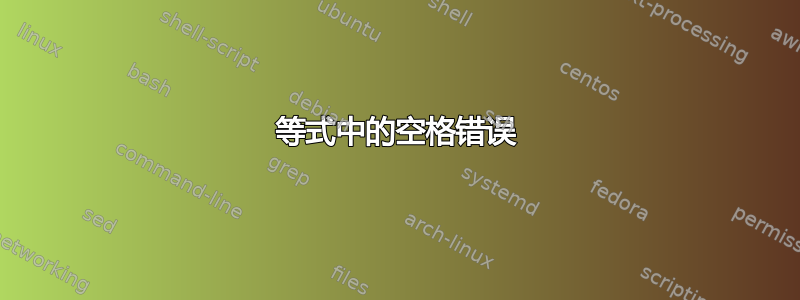
在我的LaTeX文件中,左右方程之间的间距"Einsetzungsverfahren"不正确(太大)。
这是我的文件,我做错了什么?
\documentclass{article}
\usepackage{amsmath}
\usepackage{pgfplots}
\title{Mathematik}
\date{11/07/15}
\author{Martin Fischer}
\begin{document}
\pagenumbering{gobble}
\maketitle
\newpage
\section{Gleichungssysteme}
\subsection{lineares Gleichungssystem}
\paragraph{Grundformel}
\begin{align*}
a_1 \times x + b_1 \times y = c_1 &\quad \textbf{I} \\
a_2 \times x + b_2 \times y = c_2 &\quad \textbf{II} \\
\cline{1-2}
\end{align*}
\paragraph{Beispiel}
\begin{align*}
y = -x + 2 &\quad \textbf{I} \\
4x + 3y = 2 &\quad \textbf{II} \\
\cline{1-2}
\end{align*}
\paragraph{Einsetzungsverfahren}
\textbf{I} in \textbf{II} einsetzen
\begin{align*}
4x + 3y &= 2 \Leftarrow &&y = -x + 2 \\
4x + 3(-x + 2) &= 2 \\
4x - 3x + 6 &= 2 &&y = -(-4) + 2 \\
\cline{1-4} \\
x &= -4 &&y = 6 \\
L &= \{(-4; 6)\}
\end{align*}
\paragraph{Gleichsetzungsverfahren}
\textbf{I} und \textbf{II} nach gleiche Variable aufl\"osen
\begin{align*}
y &= -x + 2 \mid \times 3 &&4x + 3y = 2 \mid - 4x \\
3y &= -3x + 6 &&\quad \textbf{I'} \\
3y &= 2 - 4x &&\quad \textbf{II'} \\
\cline{1-4} \\
3y &= 3y &&&\text{\textbf{I'} und \textbf{II'} gleichsetzen} \\
-3x + 6 &= 2 - 4x \\
x &= -4 &&y = 6 \\
L &= \{(-4; 6)\}
\end{align*}
\begin{tikzpicture}
\begin{axis}[
width=5cm,
axis lines=middle,
xlabel=$x$,
ylabel={$f(x) = x^2$},
grid=major,
scaled ticks=false,
axis equal,
xmax=5,xmin=0,
ymax=5,ymin=0,
xtick={0,...,5},
ytick={0,...,5}
]
\addplot[smooth,color=blue] {x^2};
\end{axis}
\end{tikzpicture}
\end{document}
答案1
正如 Christian Hupfer 在评论中指出的那样,使用alignat*而不是align*可能是实现对齐目标的最简单方法。为了增加\Leftarrow与右列材料之间的水平空间,我建议\qquad在第三个&符号之前插入。
\documentclass{article}
\usepackage{amsmath}
\pagenumbering{gobble}
\begin{document}
\section{Gleichungssysteme}
\subsection{lineares Gleichungssystem}
\dots
\paragraph{Einsetzungsverfahren}
\textbf{I} in \textbf{II} einsetzen
\begin{alignat*}{3}
4x + 3y &= 2 &\Leftarrow\qquad &y = -x + 2 \\
4x + 3(-x + 2) &= 2 \\
4x - 3x + 6 &= 2 & &y = -(-4) + 2 \\
\cline{1-4}
x &= -4 & &y = 6 \\
L &= \{(-4; 6)\}
\end{alignat*}
\end{document}




